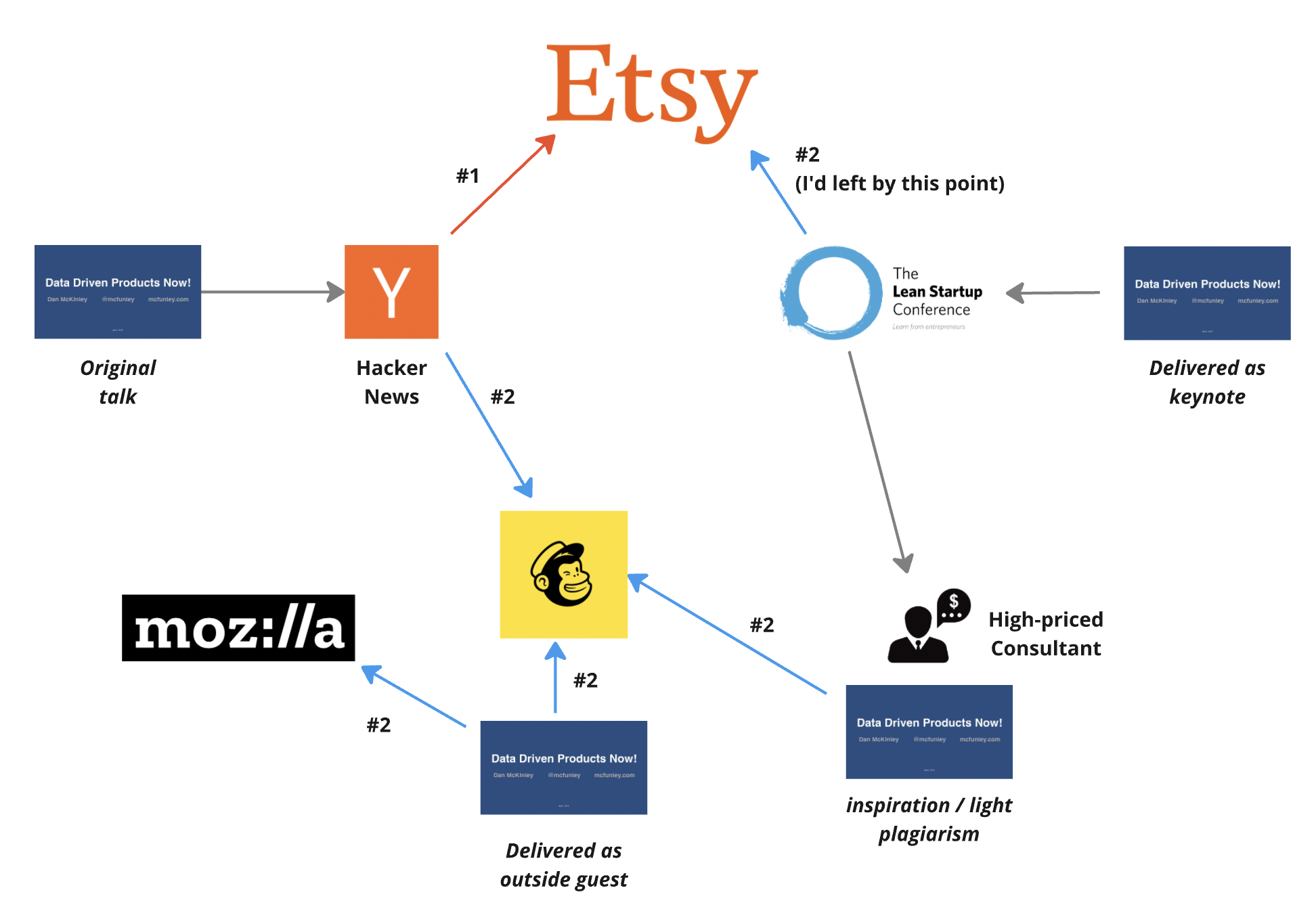In my talk Egoless Engineering I make the case that results are better when teams cooperate, that punching down and other forms of brilliant-jerkhood are actually dumb, and that leaders should reward curiosity and generosity. I think misery is a dumb strategy and I am encouraged that some folks have found this case compelling.
Some of those who find the content compelling wish they could persuade their leaders on these points, and have asked me for advice on how to accomplish this. I address this a little in the talk:
I don’t think you can grass roots [it], beyond what I’m trying to do here by making the idea more popular.
It’s on leaders to value cooperation and to reward curiosity.
I stand by this overall assessment. It’s unrealistic to expect workers to build a culture that executes well without leadership support in the best case, and against leadership’s instincts in the worst. It’s taking risks, especially in proximity to down-punchers that will attempt to undermine you.
That said, I don’t think there’s nothing you can do to win support. Over the decades I have discovered a few hacks for influencing superiors. I apologize in advance for how dumb some of this sounds. Please know that I mean this pragmatically, and sincerely. None of this advice is sarcastic. It may be darkly funny, but it is not a joke.
Hack #1: Write about it Publicly
It could be that you were hired at a company to solve a shiny problem, and came in with some amount of momentum and a mandate. That’s great, but there are only a few possibilities from here:
- The shiny problem at the company changes because you solved it (good job)!
- The shiny problem at the company changes because leadership is fickle or was wrong, or just because the world changed.
- The shiny problem is really difficult and it was unrealistic to expect anyone was going to ride in on a white horse and fix it in a short amount of time.
All of which is to say that once you work someplace, your cool factor has a brief half-life. Did they hire you to do ML? Sorry, they need “AI” now, and they are going to hire someone else on a really fantastic, different white horse for this [1].
So let’s suppose you find yourself in this situation and you want to influence leadership, but they now find you boring and don’t hear you. One tactic that has served me very well is to make my agenda shiny (again, possibly) by getting people in the broader industry buzzing about it.
Write a talk or a blog post explaining your point of view. If it’s something you’re already doing at work, feel free to imply that it’s how everyone is doing that stuff where you work. Get it on BlueSky, Mastodon, Hacker News, or wherever the conversations are happening about it. If your cause is truly just people will talk about it and give you positive feedback.
Companies and their leaders love this kind of reflected glory. Their peers will congratulate them on being such great leaders that they motivated or inspired this great work you’ve done. In reaction they will support you. Lean into it and you’ll regain your sheen (for a while).
Hack #2: Have an Outsider Say It
The odds are very good that at least some of you are reading this while facemuted in a McKinsey consultant workshop about how to write email subject lines, or something equally thrilling. If so, another leadership PSYOP tactic is right in front of you: have outsiders say the thing.

Outsiders are definitionally novel to insiders, and often already have a whole deck full of classic Simpsons references punched up and ready to present. The move here is to volunteer to start an external speaker series, and stack the agenda in your favor. Talks are great for morale anyway, so nobody needs to know what your specific ulterior motive is.
If you’re trying to persuade leadership that it’s counterproductive to frame risk management as “who’s going to get fired if X happens” (as I have occasionally tried to do) it’s more effective to launder this feedback through an ostensibly neutral outsider who is at no risk of getting fired.
A Practical Example
Much like cards in a really sick Slay the Spire deck, these tactics can synergize with one another and bestow scaling properties upon you [2]. A concrete example of this was my talk Data Driven Products Now!, wherein I tried to make a case that it was a good idea to do some napkin math before spending a year coding something. (Or, “opportunity sizing for engineers,” as my friend Roberto called it.)
Anyway, I wrote this talk after the fourth or fifth year in a row that Etsy’s big product push consumed 75% of the team’s effort for something that didn’t really stand up to such scrutiny. The other 25% of us were doing math and it was going pretty well, so I decided to represent the minority approach as “The Etsy Way” in a public talk.
- This got positive attention from outsiders, which successfully made the idea of doing napkin math much more popular internally (hack #1).
- A while later I left the company but kept doing this talk in public, where it could still ricochet back into Etsy and make things better (hack #2 - still good for me since I owned stock at this time).
- I also delivered the talk as an outside speaker at many companies, including Mailchimp and Mozilla where I eventually wound up working (hack #2).
- At Mailchimp, after my new aqui-hire sheen had worn off, we brought in an outside consultant to deliver the same material again (hack #2). This person had coincidentally been in the audience to see me give this talk at least once.

By my count, that’s at least six distinct units of influence at companies I either worked at or owned stock in for one act of writing. What a coup!
My Boring Technology work was a similar dynamic on an even grander scale.
Go Forth
I hope this has been helpful. I ask that you only deploy these tactics, which are powerful, for the causes of justice. If I can help you do this as an outsider (hack #2), don’t hesitate to drop me a line.
-
I know this stings now but stay positive! As long as you don’t overreact to this, trust me, you will be best friends with that person for life once their white horse drops dead. ↥
-
While writing both Boring Technology and Data Driven Products Now!, I was talking extensively with my friend Steve about the content. He had a big influence on both pieces. Some of the punchiest (and therefore best) sections of these were spiritually born of me ranting back and forth with Steve.
So there’s a third dimension in which my work lives on that I enjoy perhaps most of all: people mansplaining my work to Steve. Steve will suggest something wherever he works now, and a colleague of his will object. “It’s called Boring Technology Steve, ever heard of it?” This is truly the gift that keeps on giving. ↥